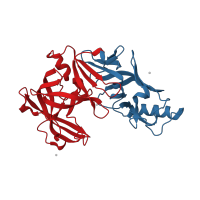EC 3.4.23.39: Plasmepsin II
Reaction catalysed:
Hydrolysis of the bonds linking certain hydrophobic residues in hemoglobin or globin. Also cleaves small molecules substrates such as Ala-Leu-Glu-Arg-Thr-Phe-|-Phe(NO(2))-Ser-Phe-Pro-Thr.
Alternative Name(s):
- Aspartic hemoglobinase II
- PFAPD
- PfAPD
GO terms
Biochemical function:
Biological process:
Cellular component:
- not assigned




